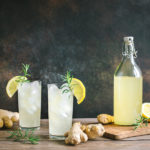By Bonnie Jenkins, Advanced Natural Wellness
There’s been a lot of talk lately about energy – especially the fact that we are running out of it. But what about your personal energy level? Do you have enough, or are you frequently exhausted and overwhelmed? If your “get up and go” got up and went, you’re not alone. In a recent survey of adults by HealthFocus International, 45 percent of respondents said they were concerned about how often they felt tired.
Whatever the reason you’re fatigued – whether you feel overworked, stressed out, or suffer from a chronic lack of quality sleep – the result can damage your overall health. But there are some easy ways to lift your flagging energy levels so you can really enjoy life again!
Sick and Tired?
Being tired has practically become an American way of life. Besides the obvious deleterious effects on the ability to function physically, being exhausted – or even having a simple lack of energy – can impair memory and concentration. It can also lead to weight gain and weaken the immune system, leaving you less able to fight off disease.
Most of the time, fatigue is caused by a less-than-ideal lifestyle that can include lack of sleep (including interrupted sleep), a lack of physical activity, mental stress and poor eating habits. Researchers have found that nearly three-quarters of Americans experience less than ideal sleep quality at least a few nights each week. One in five adults says it affects his or her sex life, and one in three says it interferes with the ability to function during the day.
It could be stress or anxiety that is keeping you up at night. Or you could be consuming too much caffeine. But it could also be medications that are causing your sleeplessness. Check with your doctor or pharmacist to see if any prescription drug you’re taking could be at the root of the problem.
In some cases, fatigue and lethargy can be the result of an undiagnosed medical condition. If you eat well, exercise, and get plenty of sleep, ask your doctor about other potential causes – like a B12 deficiency, depression, or chronic fatigue syndrome.
MD Exposes the Hidden Danger to Your Eyes

When your eyesight starts to fail, it's a real problem. Suddenly you can't go to the grocery store... you can't get to the doctor if you have an emergency... you can't meet your friends for dinner…
Your "regular" doctor doesn't have time to keep up with the latest research. And the same goes for eye doctors. They go to school to learn how to fit you for glasses and contacts, but have no way of preventing the damage and loss of eyesight that threatens your freedom and independence.
Let me show you something that explains a LOT about how your eyes work.
In my FREE Special Report, I'll show you a HUGE, untapped resource for your eyes that safely and naturally restores clear, effortless eyesight.
Click here to get started...
You should also see your doctor if you wake up frequently during the night. As you get older, the quality of your sleep can be affected by medical conditions like heart disease, cancer, arthritis, osteoporosis, prostate enlargement, reflux, restless leg syndrome, and hot flashes.
Eat for Energy
If you get a good seven to eight hours of shut-eye most nights but are still tired, sleep may not be the culprit behind your flagging energy levels. Try these easy diet fixes:
When life gets hectic, it’s easy to skip meals or grab a quick bite whenever you get the chance. But, sticking to a regular eating schedule provides your body with a steady supply of energy throughout the day. That’s especially true if you eat every three to four hours. Eating a light and healthy meal every few hours also has the side benefit of helping to ensure you don’t overeat at any one time – a guaranteed energy-zapper.
It’s also really easy to get into the fast food trap. If you’re short on time, it’s easy to be lured by the call of the drive-thru. And, after a hard day, convenience foods or take-out sounds oh-so-easy. But these types of food are packed with salt, sugar, and refined carbohydrates that can steal your energy. Sure, they might provide a quick burst of energy, but the spurt is short-lived before you crash and burn.
Also, eating carbs alone – with no protein – boosts brain serotonin, which is sleep-inducing. Balancing carbohydrates with fiber, protein, and unsaturated fats slows the absorption of carbs, so energy levels remain stable for longer.
The best high-energy diet is rich in complex carbohydrates – whole grains, beans, fruits and vegetables – with ample lean protein. Judicious amounts of unsaturated fats – like extra virgin olive oil or organic canola oil – can also keep fatigue at bay.
The Right Stuff
One of the best ways to energize your body is with a glass of water. Your body is made up of 70 percent water. Every system in your body depends on being adequately hydrated. For example, water flushes toxins out of vital organs, carries nutrients to your cells, and provides a moist environment for ear, nose, and throat tissues. Recent research from the University of Utah suggests that dehydration slows the body’s metabolic rate, which, in turn, affects your energy level.
Are You Suffering From...
- Love handles and a pot belly
- Romance that isn't what it used to
- Forgetfulness and inattention
- Low (or no) strength and endurance
- A sex drive that's shifted into neutral...or worse
If so...you may have Mature Male Burnout. Click here to discover more about this unique condition and what you can do about it.
Try to drink at least two liters (eight cups) of water each day – more if you’re active. A good way to tell if you’re getting enough fluids is to check your urine. If it’s pale in color, you’re well-hydrated. But if it’s dark yellow, or if you don’t feel the need to urinate at least several times a day, you’re not drinking enough.
Your fluid intake doesn’t need to consist of only water. Fruit juice, tea, soups, and watery fruits and veggies (watermelon, green peppers, etc.) all contribute to healthy hydration. But one type of beverage that doesn’t make the grade is alcohol. Research in both animals and humans shows that alcohol makes it easier to fall asleep, but it can have the opposite effect during the second half of the night, causing your sleep to become shallow and disrupted, leading to lethargy and fatigue during the day.
Supplemental Energy Savers
The B vitamins have earned a reputation as the energy vitamins – and for good reason. The body needs these water-soluble vitamins to process energy and keep you mentally alert. But there is little evidence supporting the use of megadoses of B-complex vitamins to combat everyday stress, boost energy, or control food cravings, unless you’re suffering from a deficiency of one or more of them. What you don’t get from food is easily supplemented with a high-quality multivitamin. Just be aware that the B vitamins are not stored in the body, so it’s important to replenish your supply daily.
Ginseng is one of the most commonly used herbal energy boosters for fighting off fatigue and improving stamina and concentration. Ginseng’s actions in the body are thought to be due to a complex interplay of constituents. The primary group is the ginsenosides, which are believed to counter the effects of stress and enhance intellectual and physical performance. There are several types of ginseng – American ginseng, Korean ginseng, red Chinese ginseng, and Siberian ginseng (also known as Eleuthero). But even though they come from different locales, they all appear to boost energy levels.
In one month-long trial conducted at California State Polytechnic University, 29 healthy adults were given 1,350 mg. of either American ginseng or a placebo before exercising. Those taking the ginseng were able to exercise seven minutes longer than those in the placebo group. Another study of 96 people suffering from chronic fatigue found that those taking Siberian ginseng reported significantly less fatigue after two months of supplementation. To get everything you can from the ginseng family, you may want to try taking more than one type of ginseng. Look for a supplement that contains all four types of ginseng to boost your energy levels.
Rhodiola is another herb that reduces fatigue. Considered an adaptogen, rhodiola was found to reduce fatigue in 56 physicians on night duty in a 2000 study published in Phytomedicine. Another double-blind trial of 60 volunteers by Swedish researchers found that rhodiola improved stress-related fatigue and increased mental performance, particularly the ability to concentrate. But this fatigue fighter also boosts adrenal function – and healthy adrenals are essential for an energetic life. The recommended dose is 100 to 400 mg. of a standardized extract taken twice daily.
One Last Thing …
This should go without saying, but if you’re suffering from an energy deficit, ditch the caffeine. Sure, you get a short-term buzz, but after a few hours you’re left feeling more fatigued than when you started. And too much caffeine can interfere with a good night’s sleep.
These days, caffeine isn’t limited to coffee and espresso. It’s also added to soda, gum, energy drinks, and even fruit juices. Caffeine is considered safe by the FDA, but the American Heart Association recommends limiting daily consumption to two 8-ounce cups of coffee (about 200 milligrams caffeine).
If you must have your morning caffeine, you might want to consider switching to green tea. Not only is green tea naturally lower in caffeine, it also boasts potent antioxidants that can benefit your immune system.
Research Brief …
You know I’m a super huge fan of vitamin D. Now the sunshine vitamin may help prevent Parkinson’s disease. So suggests a group of researchers from Emory University School of Medicine in Atlanta after analyzing vitamin D levels in blood samples from 300 people – 100 with Parkinson’s disease, 100 with Alzheimer’s disease, and 100 healthy controls. The study found that more than 55 percent of the Parkinson’s sufferers had low levels of D compared to 41 percent of those with Alzheimer’s and 36 percent of controls.
While people with neurological diseases may avoid the outdoors and thus be exposed to less sunlight, the researchers suggest that lower levels of the vitamin in those with Parkinson’s compared to those with Alzheimer’s hints at a link between Parkinson’s and D. Although more research needs to be done, you can still be on the safe side and take 1,000 IU of supplemental D daily. At the very least, this do-everything vitamin promotes stronger bones, guards against a variety of cancers, and may even protect you from heart disease. It doesn’t get much better than that!
References:
Hartz AJ, Bentler S, Noyes R, et al. “Randomized controlled trial of Siberian ginseng for chronic fatigue.” Psychological Medicine. 2004;34:51-61.
Liang MT, Podolka TD, Chuang WJ. “Panax notoginseng supplementation enhances physical performance during endurance exercise.” Journal of Strength and Conditioning Research. 2005;19:108-114.
Evatt ML, Mahlon R. DeLong MR, Khazai N, et al. “Prevalence of Vitamin D Insufficiency in Patients With Parkinson Disease and Alzheimer Disease.” Archives of Neurology. 2008;65:1348-1352.
Olsson EM, von Schéele B, Panossian AG. “A Randomised, Double-Blind, Placebo-Controlled, Parallel-Group Study of the Standardised Extract SHR-5 of the Roots of Rhodiola rosea in the Treatment of Subjects with Stress-Related Fatigue.” Planta Medica. 2008 Nov 18. [Epub ahead of print]






